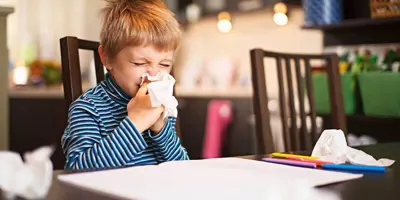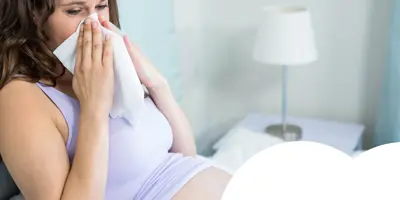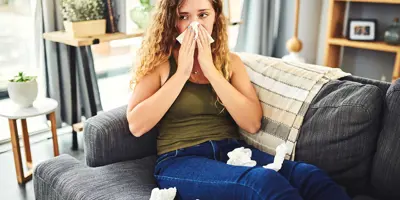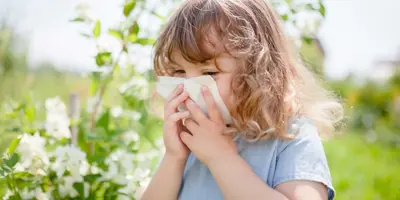52 people found this helpful

Achoo! Sneezing is universal: sometimes annoying, sometimes satisfying or snotty, but always loud! A sneeze can be a result of various causes – a cold, allergies, a particularly vicious dust bunny. Arming yourself with answers to “what does sneezing mean?” and “why do we sneeze when we have a cold?” means the next time you're struck by the powerful tickle in your nose, you'll know better than to wipe snot on your sleeve for the next week while you get on with the endless dinners and dishes. You’ll know that you deserve a rest!
Why do humans sneeze? The facts
If you’re wondering “why do humans sneeze?”, you’re in the right place. The physical process that triggers sneezing happens when the nerves in our sinuses are stimulated. There are a few reasons why sinus nerves kick into action and cause a sneeze. The reasons why we sneeze are:
- When we have allergies.1
- When we suffer from nasal congestion.
- When foreign particles like dust or pepper tickle the backs of our noses.
- If we have something stuck inside our nose.
- Exposure to mould spores.
As a protective mechanism, these nerves tell the body to expel air through our noses forcefully to clear them.
Why do we sneeze twice? and other FAQs
It’s all well and good knowing about the causes and mechanism of sneezing, but you probably have other questions too. Here are a few frequently asked questions and the answers you’ve been dying to find out about how and why we sneeze:
- Why do we sneeze twice? It is a common occurrence to sneeze more than once, as sometimes a single sneeze may not be sufficient to clear an irritant from your nose. Multiple consecutive sneezes are a natural response to irritation in the nasal passages and should not be a cause for concern.
- Is sneezing good for you? Sneezing is a natural and useful biological function, and it’s usually nothing to worry about. If you are sneezing very often or uncontrollably, you might want a remedy to help you figure out how to stop sneezing. Health shops and pharmacies will stock mild cold or allergy medication that can help to clear your nose and soothe your sinuses.
If you’re concerned about the regularity of your sneezing, or if it’s frequently disrupting your day, consult a medical professional for advice. - What does sneezing mean for us? In wondering what does sneezing mean for us humans, you may have noticed that kind of gross, snotty mess that comes along with an epic sneeze. The forceful expulsion of air from the lungs that comes out of our noses and mouths often takes mucus with it. This is a good thing for our bodies, as the mucus might contain foreign particles that irritate the insides of our nasal cavities, or bacteria that threatens to harm our bodies.2
- What happens when you sneeze – why does it feel good? There are studies that suggest that what happens when you sneeze is a release of endorphins3, which is why sometimes a powerful sneeze gives us a strangely feel-good boost. So, to have an instant pick-me-up, all you need to know is how to sneeze!
What does it mean when you sneeze too much?
We’ve all been there. A sneeze triggers another sneeze which triggers yet another one, and while it would be ideal if that chain reaction of sneezes propelled you through that grocery aisle with haste (you know, so you can get home to the laundry and the dinner and the washing up), it won't. You can, however, follow these easy tips to stop yourself sneezing quite so much:
- Blow your nose. Give your natural mechanism a helping hand to expel any unwanted particles in your nose by giving it a good blow into a clean tissue. This could be enough to stop you sneezing.
- Be sure to treat your allergies. From pollen to dust, there are a variety of sneeze causing allergens. Make sure you know what your triggers are and treat them accordingly.
- Drink plenty of fluids. If you’re suffering with a bit of a cold, staying hydrated and drinking plenty of water will help to ensure you avoid sneezing.
- Give your home a thorough clean. Be sure to dust and vacuum to expel any dust mites that could be causing irritation. Be sure to keep on top of the cleaning schedule so it doesn’t take up too much of your time.
- Invest in a humidifier. This is a great way to help stop sneezing if the air in your home is too dry – especially at night.
- Wash your bed linen. Use a hot wash (at least 60°C) to kill off any unwanted bed fellows such as dust mites. You may also want to give your sofa cushions, curtains, and other fabrics around your home a clean too!
If frequent sneezing continues for more than a few weeks and you don’t know what the cause is, consult your GP for advice on how to stop sneezing and identify possible allergens. You should also contact a health professional if you notice any additional symptoms such as wheezing, shortness of breath and fever, which could be an indication of a more serious underlying condition such as asthma.4
When you’re feeling unwell, it’s important to take that little bit of time to look after yourself: get the facial, buy the new bath salts, cosy up in the corner with a book. And for an indulgent moment every day, stock up on Cushelle Quilted Rhubarb & Raspberry toilet paper for a soft and skin-loving* clean with delicately scented core. Why? Because you, your nose, and your behind deserve the best.
What does sneezing do to others and how to stop germs from spreading
Sneezing may be good for you, but while your body is getting rid of these germs don’t forget to protect people around you from them. Below are some top tips for ensuring you keep everyone safe from the germs until you stop sneezing:
- Keeping a packet of strong, yet soft tissues on hand will help you to catch coughs and sneezes hygienically.
- Always remember to sanitise your hands after a sneeze.
- For extra protection, a packet of antibacterial wet wipes is also a useful way to clean hands and surfaces.
How to sneeze when you need to, but just can’t!
Nothing is more disappointing than feeling a sneeze building up, only for it never to happen. However, trying to trigger a sneeze yourself isn’t as easy as, say, catching a yawn from someone else! Whilst some are convinced that looking towards a bright light5 or plucking your eyebrows6 can help to stimulate a sneeze, our advice is to wait it out. When the sneeze is ready, it’ll come! And we all know how satisfying it feels when it does.
Now you know why do we sneeze when we have a cold, is sneezing good for you, and what does it mean when you sneeze. And if you’re pregnant, check out why you might find yourself sneezing more frequently, or if you’re prone to hay fever, we have some great natural and herbal remedies to try at home. But if you’re worried something is wrong, contact your GP. Generally, though, there is no need to worry about this completely natural mechanism!
*To verify claims, please email verify.uk@essity.com for full verification details.
Sources:
1 “Allergic Rhinitis”, NHS
2 Coughs and Sneezes: Their Role in Transmission of Respiratory Viral Infections, Including SARS-CoV-2, National Library of Medicine
3 Correlation of Serum β-Endorphin and the Quality of Life in Allergic Rhinitis, National Library of Medicine
4 Phlegm, Mucus and Asthma, Asthma UK
5 Sneeze reflex: facts and fiction, National Library of Medicine
6 Sneezing induced by sexual ideation or orgasm: an under-reported phenomenon, National Library of Medicine.
Related articles
Runny nose remedies: 6 ways to stop a runny nose
Looking for a runny nose remedy you can make at home? For five family-friendly ways to stop a runny nose, click here.

Sneezing during pregnancy: causes, dos and don’ts
Experiencing frequent sneezing in pregnancy or find sneezing hurts when pregnant? Click to learn why sneezing while pregnant is perfectly normal.

What are the causes of watery eyes? The 7 causes of runny eyes to look out for
What does it mean if your eyes keep watering? From allergies to blocked tear ducts, check out what causes runny eyes and reasons for watery eyes, here.

How to know the difference between allergies and a cold
What’s the difference between a cold and allergies? They both involve runny noses and sneezing! Here’s how to know the difference between a cold and allergies.

Pollen allergy in children: How to cope with kids’ hay fever
The symptoms of pollen allergy in children can be tackled. Click here for tips on how to treat hay fever in children.

5 Home Remedies for a Tickly Cough
SOS: Tickly cough home remedies needed! Here at Cushelle we've put together a few tips to get rid of a tickly cough: from honey to soup, read on for more!




